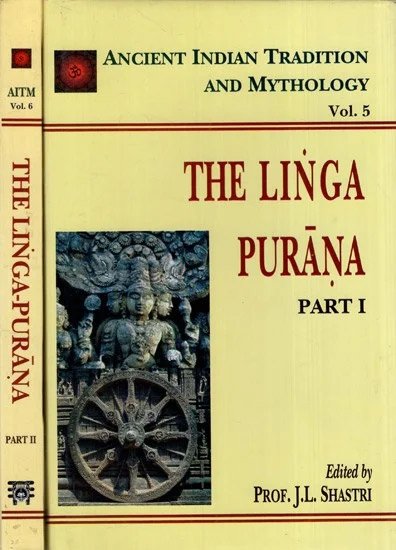The Linga Purana
by J. L. Shastri | 1951 | 265,005 words | ISBN-10: 812080340X | ISBN-13: 9788120803404
This page describes Glory of the Pashupata-Vrata which is chapter 108 of the English translation of the Linga Purana, traditionally authored by Vyasa in roughly 11,000 Sanskrit verses. It deals with Shaiva pilosophy, the Linga (symbol of Shiva), Cosmology, Yugas, Manvantaras, Creation theories, mythology, Astronomy, Yoga, Geography, Sacred pilgrimage guides (i.e., Tirthas) and Ethics. The Lingapurana is an important text in Shaivism but also contains stories on Vishnu and Brahma.
Chapter 108 - Glory of the Pāśupata-Vrata
The sages said:
1. This elder brother of Dhaumya was seen by Kṛṣṇa, son of Vasudeva, of unafflicted activities. From him he acquired the divine holy rite of Pāśupata.
2. O Sūta, how was the knowledge acquired from him by the intelligent Kṛṣṇa? It behoves you to recount this story that destroys all sins.
Sūta said:
3. Although the eternal lord had incarnated of his own accord as the son of Vasudeva, yet he despised human form and so performed purificatory rites for the body.
4. For obtaining sons the lord wanted to perform penance. He went to the hermitage of Upamanyu and saw that sage there.
5. O brahmins, on seeing Upamanyu, the elder brother of Dhaumya, Kṛṣṇa circumambulated him three times and bowed to him respectfully.
6. By the mere sight of that intelligent sage all the impurities of Kṛṣṇa originating from the body as well as physical activities perished.
7-8. O leading brahmins, repeating the mantras beginning with “Agniḥ” and “Vāyuḥ” in due order, Upamanyu of great lustre dusted him with Bhasman. With a delighted mind the sage gave him the perfect divine knowledge pertaining to Paśupati. O brahmins, it was due to the favour of the sage that Kṛṣṇa became initiated honourably in the divine rite of Paśupati.
9. By means of penance he saw lord Maheśvara at the end of a year. On seeing the lord accompanied by Ambā[1] and the Gaṇas he obtained a son known as Sāmba who was unbewildered.
10. Ever since then, all the divine sages of unimpeded holy rites and all the devotees of Paśupati surrounded Kṛṣṇa and stood by him.
11-14. I shall recount another holy rite that bestows perpetual salvation upon all living beings. The devotee shall make a gold girdle, a shaft-receptacle or support, a gold block spherical in shape and a fan with a handle. Then the man or woman shall make an ink-pot and a pen. He shall gather a knife or scissors and a vessel. The devotee shall dust his body with Bhasman and give these articles to a devotee of Paśupati. He shall dedicate a golden, silver or copper vessel in accordance with his capacity. He shall then worship the yogins.
15. All these persons shall be liberated from their sins along with the members of their families. They will go to the divine region of Rudra. No doubt need be entertained in this respect.
16. Hence, by means of charitable gifts a householder is liberated from the bondage of worldly existence. If one makes charitable gifts to yogins, Śiva becomes pleased quickly.
17. If a person desires salvation, he shall make charitable gifts of kingdom, son, riches, horse, a vehicle or all his possession.
18. One shall strenuously attempt to achieve the fixed goal through his physical body that is uncertain and un-fixed. The excellent and eternal Pāśupata vrata is the cause of redemption from the ocean of worldly existence.
19. Thus everything has been succinctly mentioned to you. He who reads this or listens to this undoubtedly goes to the World of Śiva.
Footnotes and references:
[1]:
Sāmbam—ambayā saba; pārvatī-sahitam Śivatoṣiṇī. accompanied by the mother goddess Pārvatī.
